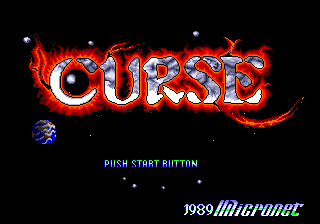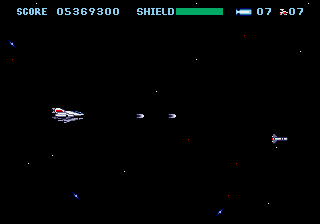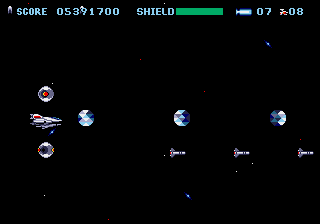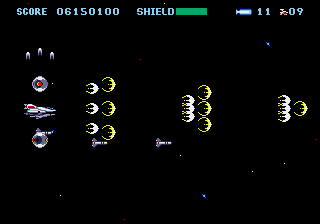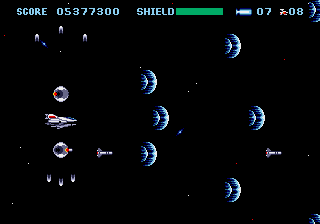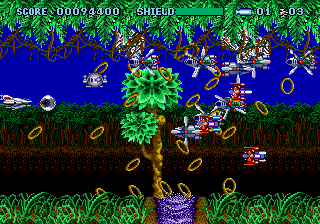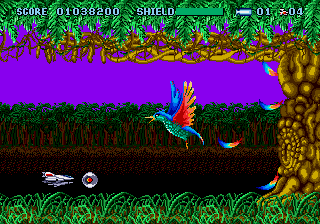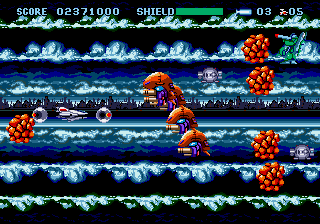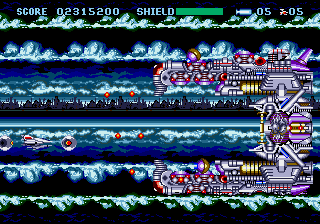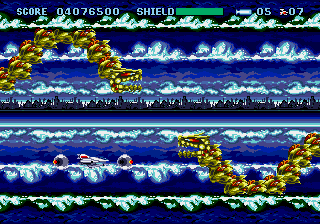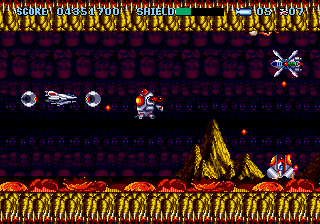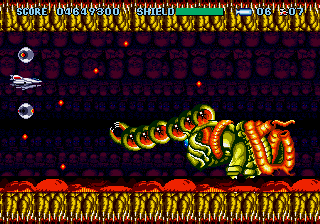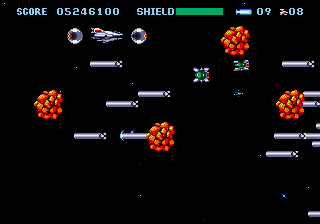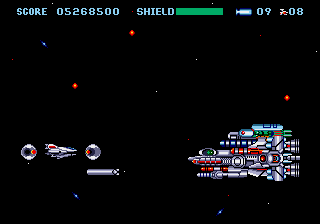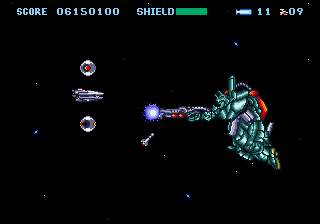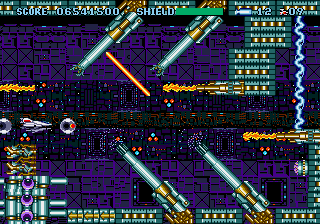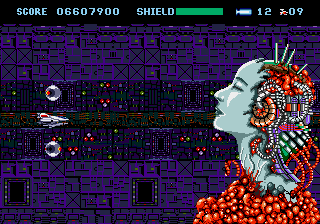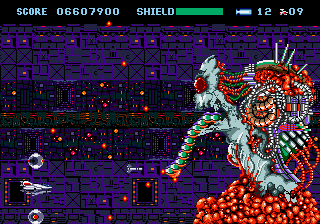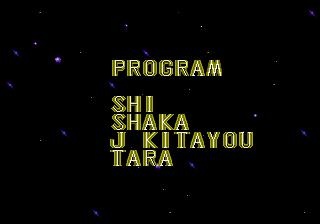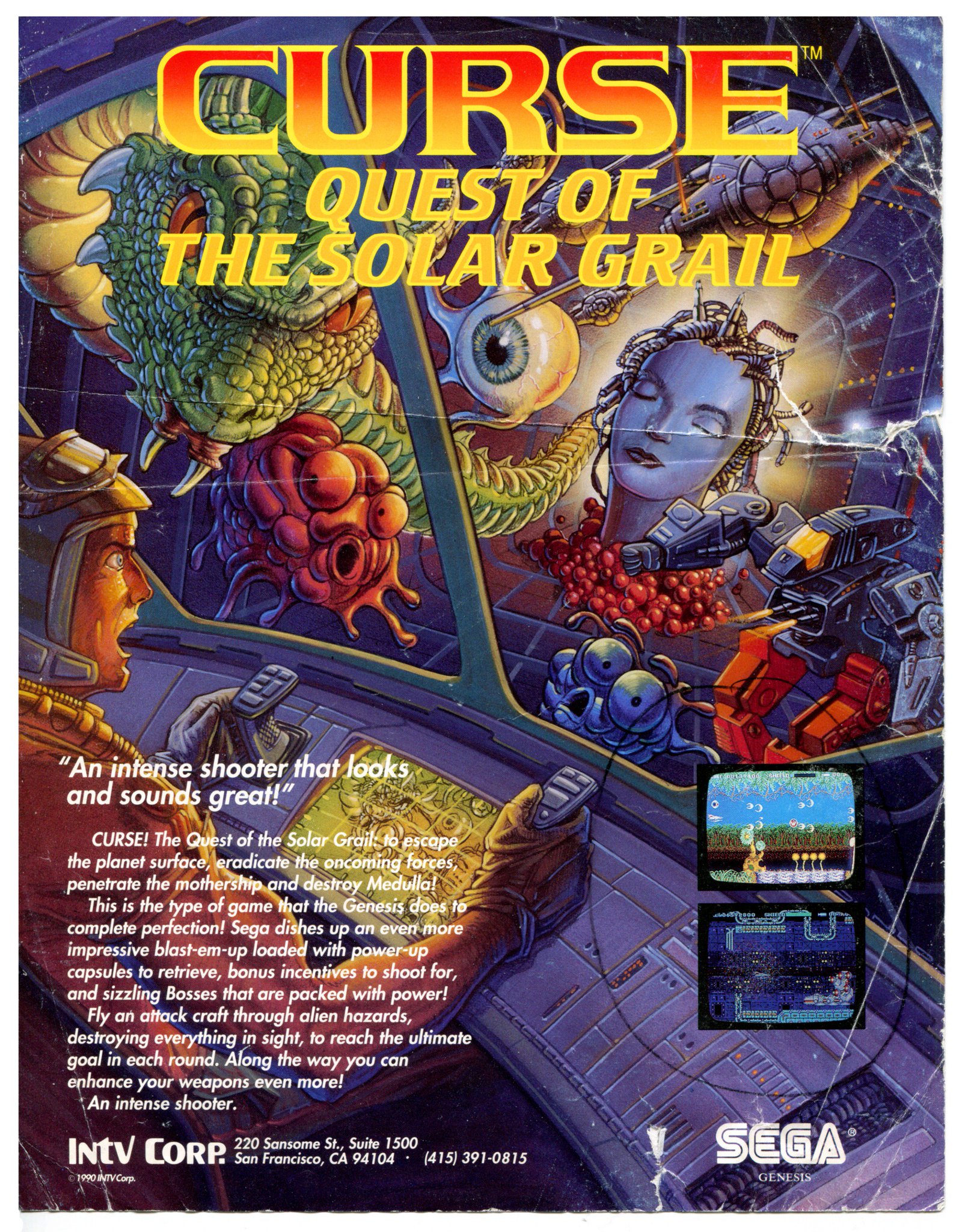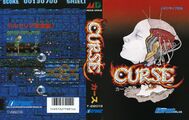Curse
From Sega Retro
| Curse | |||||||||||||||
|---|---|---|---|---|---|---|---|---|---|---|---|---|---|---|---|
| System(s): Sega Mega Drive | |||||||||||||||
| Publisher: Micronet | |||||||||||||||
| Developer: Micronet | |||||||||||||||
| Genre: Shooting[1] | |||||||||||||||
| Number of players: 1 | |||||||||||||||
|
Curse (カース) is a 1989 Sega Mega Drive shoot-'em-up, among the first on the system, released by Micronet exclusively in Japan.
The game has been criticized for its poor optimization (choppy scrolling and low frame rate), although its music was praised.
Contents
Story
The story takes place in an alien solar system and focuses on the history of its two inhabited planets: Barcelia (バルセリア) and Seneca (セネカ). For many years, the people of these planets lived in harmony together with the seemingly more advanced Barcelians continually visiting the Senecans. However, something happened on Barcelia: something caused the Barcelians to shut off all forms of communication, visitation and activity with Seneca. Over time, Barcelia's environment died out, leaving only a planet-wide barren terrain. Hundreds of years have now passed and the current generation of Senecans see Barcelia as nothing but a dead husk with the concept of life and companionship on it being mere, long forgotten legends.
One day, an enormous attack force flies from Barcelia and attacks Seneca without warning. Confirmed to be the Barcelian Military, the invaders cripple Seneca's defense forces. Besides being well armed and equipped, the Barcelia Military is also able to manipulate the wildlife to do its bidding through unknown means, ensuring no possible escape to safety. The desperate people of Seneca eventually discovered an ancient star fighter abandoned by the Barcelians called the Baldanders (バルトアンデルス). Using its technology, the people of Seneca use the Baldanders in a counter-attack against the Barcelian invasion to destroy their main battleship: a large, mysterious warship known only as Mother (マザー).
Gameplay
The game is a horizontally scrolling shoot-'em-up. The object of the game is to shoot all other enemies that appear on screen and avoid crashing into bullets, enemies or foreground scenery. The Baldanders starfighter moves in any direction using the D-Pad. It shoots its weapon with ![]() , which can be held for rapid-fire. The Baldanders also has a screen-clearing bomb that it can deploy with
, which can be held for rapid-fire. The Baldanders also has a screen-clearing bomb that it can deploy with ![]() . The standard weapon can be changed by collecting power-ups. Collecting the power-up for the currently equipped weapon three times in a row upgrades the weapon and also gives the player another bomb. The player can also collect power-ups that add homing missiles to the standard weapon fire.
. The standard weapon can be changed by collecting power-ups. Collecting the power-up for the currently equipped weapon three times in a row upgrades the weapon and also gives the player another bomb. The player can also collect power-ups that add homing missiles to the standard weapon fire.
The player can acquire up to two options that follow the Baldanders and augment its fire. The options are positioned at opposite ends of the Baldanders and fire in opposite directions; they can be rotated around with ![]() . They always fire away from the Baldanders, so rotating them also changes their direction of fire. The options are invulnerable, so they can be used to shield the ship from enemy fire.
. They always fire away from the Baldanders, so rotating them also changes their direction of fire. The options are invulnerable, so they can be used to shield the ship from enemy fire.
The Baldanders is equipped with a shield that can take multiple hits from enemy fire before it is destroyed. However, the ship is destroyed by colliding with objects such as terrain or asteroids, regardless of the shield strength remaining. The Baldanders revives in place after it is destroyed (as long as the player has extra lives remaining), except on the final stage, where the player must start the stage over from the beginning. Extra lives are awarded every one million points earned. There are no continues, so the game ends if the player runs out of lives.
Weapons
| Normal Shot (ノーマル・ショット) | |
|---|---|
| The initially equipped weapon. It is a single stream of bullets and cannot be upgraded. | |
| Clash (クラッシュ) | |
| A slow-firing cluster of gray, explosive crystals that scatter shrapnel in the opposite direction of their impact. | |
| Wide Shot (ワイド ビーム) | |
| A helical beam that can shoot through every foreground object (except for the flying orange iron rock objects). | |
| V-Laser (ブイ レーザー) | |
| A spreadshot that fires in three directions. |
Items
| Speed Up | |
|---|---|
| Increases the movement speed of the Baldanders. | |
| Shield (シールド) | |
| Fully restores the shield. | |
| Option (オプション) | |
| Equips an option to follow the Baldanders and augment its fire, up to 2 at a time. | |
| Clash | |
| Changes to the Clash weapon or upgrades it if already equipped. | |
| Wide Shot | |
| Changes to the Wide Shot weapon or upgrades it if already equipped. | |
| V-Laser | |
| Changes to the V-Laser weapon or upgrades it if already equipped. | |
| Missile | |
| Adds homing missiles to the standard weapon fire. |
Stages
| Seneca Forest (セネカの森) | |
|---|---|
| Over Seneca (セネカ上空) | |
| Barcelia Forward Base (パルセリア先発隊基地) | |
| Outer Space Guerilla Corps (宇宙空間遊撃隊) | |
| Inside the Spaceship Mother (航宙母艦マザー内) | |
History
Curse was set to be released in North America by INTV Corporation, which had broken away from Mattel following the North American video game crash, and held the rights to the earlier Intellivision console. The game was one of the first non-Intellivision projects to be undertaken by the company (NES and Game Boy projects were also in development) and was announced in 1990. Despite being advertised, dated (for June 1990[4]) and even reviewed, the North American version did not materialise, probably due to the poor quality of the original Japanese release.
Production credits
- Program: Shi, Shaka, J Kitayou, Tara
- Design: Jiela, Oza
- Music: Shaka
- Special Thanks: Kitazawa, Takano
- Publicity: Nakasugi[6]
Digital manuals
Magazine articles
- Main article: Curse/Magazine articles.
Promotional material
Artwork
Physical scans
| Sega Retro Average | |||||||||||||||||||||||||||||||||||||||||||||||||||||||||||||||||||||||||||||||||||||||||||||||||||||||||||||||||||||||
|---|---|---|---|---|---|---|---|---|---|---|---|---|---|---|---|---|---|---|---|---|---|---|---|---|---|---|---|---|---|---|---|---|---|---|---|---|---|---|---|---|---|---|---|---|---|---|---|---|---|---|---|---|---|---|---|---|---|---|---|---|---|---|---|---|---|---|---|---|---|---|---|---|---|---|---|---|---|---|---|---|---|---|---|---|---|---|---|---|---|---|---|---|---|---|---|---|---|---|---|---|---|---|---|---|---|---|---|---|---|---|---|---|---|---|---|---|---|---|---|
|
| 52 | |
|---|---|
| Based on 23 reviews | |
| Mega Drive, JP |
|---|
Technical information
- Main article: Curse/Technical information.
References
- ↑ 1.0 1.1 https://sega.jp/history/hard/megadrive/software_l.html (Wayback Machine: 2020-07-02 23:21)
- ↑ Beep! MegaDrive, "November 1989" (JP; 1989-XX-XX), page 7
- ↑ https://www.amusement-center.com/project/egg/game/?product_id=1114
- ↑ 4.0 4.1 Electronic Gaming Monthly, "July 1990" (US; 1990-xx-xx), page 16
- ↑ File:Curse MD credits.pdf
- ↑ Mega Drive Fan, "January 1990" (JP; 1989-12-08), page 82
- ↑ 1700 igr dlya Sega, "" (RU; 2001-xx-xx), page 53
- ↑ Aktueller Software Markt, "Avril 1990" (DE; 1990-03-30), page 77
- ↑ Beep! MegaDrive, "February 1990" (JP; 1990-01-08), page 70
- ↑ Complete Guide to Consoles, "Volume Two" (UK; 1990-04-xx), page 22
- ↑ Complete Guide to Consoles, "Volume IV" (UK; 1990-11-xx), page 28
- ↑ The Complete Guide to Sega, "" (UK; 1991-05-xx), page 45
- ↑ Console XS, "June/July 1992" (UK; 1992-04-23), page 128
- ↑ Computer & Video Games, "May 1990" (UK; 1990-04-16), page 102
- ↑ Entsiklopediya luchshikh igr Sega. Vypusk 1, "" (RU; 1999-xx-xx), page 303
- ↑ Famitsu, "1990-01-05,19" (JP; 19xx-xx-xx), page 20
- ↑ Sega Mega Drive Advanced Gaming, "January 1993" (UK; 199x-xx-xx), page 91
- ↑ Mega Drive Fan, "December 1990" (JP; 1990-11-08), page 79
- ↑ Mega Play, "November/December 1990" (US; 1990-xx-xx), page 29
- ↑ MegaTech, "Xmas 1991" (UK; 1991-12-06), page 77
- ↑ Mean Machines Sega, "October 1992" (UK; 1992-09-xx), page 138
- ↑ Power Play, "3/90" (DE; 1990-02-19), page 103
- ↑ Sega Power, "October 1991" (UK; 1991-09-05), page 53
- ↑ Sega Pro, "December 1991" (UK; 1991-11-21), page 21
- ↑ Sega Pro, "April 1993" (UK; 1993-03-11), page 64
- ↑ Sega Saturn Magazine, "September 1995" (JP; 1995-08-08), page 87
- ↑ Tricks 16 bit, "Tricks Sega Gold 800 igr" (RU; 1998-03-20), page 12
- ↑ User, "Ioúlios-Ávgoustos 1991" (GR; 1991-0x-xx), page 87
| Curse | |
|---|---|
|
Main page | Hidden content | Magazine articles | Reception | Region coding | Technical information
Prototypes: 1990-06-26
| |
